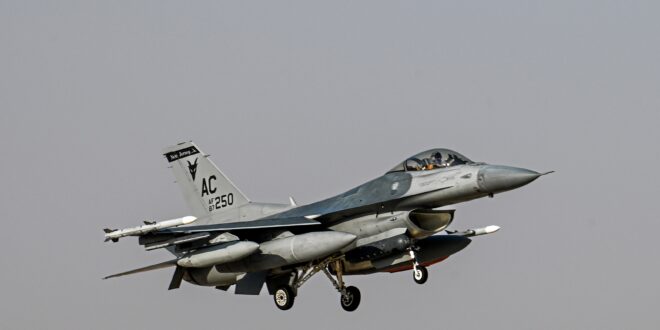by Susan Katz Keating
The Israel Defense Forces struck several military targets in Syria after rockets were fired from Syria toward Israelis in the Golan Heights, the IDF said Tuesday night. The announcement came as the Pentagon confirmed that a squadron of American F-16 Fighting Falcon aircraft arrived today in the region.
Israeli fighter jets hit military infrastructure and mortar launching sites, the IDF said.
Attacks on American and Israeli forces have been supported by the regime inside Iran, officials have said.
As fighting intensifies between Palestinian terrorist group Hamas and Israel, Iran has been increasingly vocal about the prospect of additional firepower entering the fray to score a victory for what Tehran calls the “axis of resistance” against Israel.
READ MORE about Iran’s “Axis of Resistance”
The axis, refined by the Islamic republic over the last four decades, is a loose-knit network of proxies, Tehran-backed militant groups, and allied state actors who play an important role in Iran’s strategy to oppose the West, Arab foes, and, primarily, Israel.
“We know that the groups conducting these attacks are supported by the [Islamic Revolutionary Guard Corps] and the Iranian regime,” Pentagon Press Secretary Air Force Brig. Gen. Pat Ryder said during a Tuesday briefing today. “What we are seeing is the prospect for more significant escalation against U.S. forces and personnel across the region, in the very near term, coming from Iranian proxy forces and ultimately from Iran.”
American forces in Iraq and Syria have been attacked with drones or rockets at least 13 times over the past week, Ryder said.
As part of its force protection measures, the U.S. has sent a number of military assets to the region. These include two aircraft carrier strike groups, along with a Terminal High Altitude Area Defense battery and additional Patriot missile batteries, the Pentagon said. The department also has sent advisors with extensive urban warfare experience to Israel.
“In this moment of heightened alert, we are vigilantly monitoring the situation in the region and will take necessary and proportionate action to defend U.S. and Coalition forces,” U.S. Central Command said in a statement.
At the Pentagon, Ryder said that the U.S. does not want the current war to widen into a broader regional conflict.
Said Ryder: “Our message to any country or group thinking about trying to take advantage of this situation to widen the conflict is, don’t.”
 Soldier of Fortune Magazine The Journal of Professional Adventurers
Soldier of Fortune Magazine The Journal of Professional Adventurers






